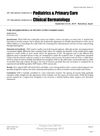 36 citations,
November 2018 in “American Journal of Clinical Dermatology”
36 citations,
November 2018 in “American Journal of Clinical Dermatology” Alopecia is linked to various health and mental conditions, impacts life quality, and needs medical attention beyond its cosmetic effects.
 19 citations,
August 2000 in “International Journal of Dermatology”
19 citations,
August 2000 in “International Journal of Dermatology” Minoxidil and finasteride can slow or halt hair loss, but may have side effects.
 8 citations,
April 2020 in “Facial Plastic Surgery Clinics of North America”
8 citations,
April 2020 in “Facial Plastic Surgery Clinics of North America” Minoxidil, finasteride, and low-level laser light therapy are effective FDA-approved treatments for hair loss.
 8 citations,
April 2006 in “Acta dermato-venereologica”
8 citations,
April 2006 in “Acta dermato-venereologica” Dovobet ointment used overnight effectively reduces scalp psoriasis severity and itch.
3 citations,
May 2007 in “Pediatrics in review” Ringworm of the body and scalp is treated with antifungal creams and oral medication, and children with scalp ringworm don't need to miss school.
 1 citations,
October 2023 in “International journal of Ayurveda and pharma research”
1 citations,
October 2023 in “International journal of Ayurveda and pharma research” Herbal medications might be safer and more effective for hair loss than synthetic treatments.
 1 citations,
July 2023 in “Cutis”
1 citations,
July 2023 in “Cutis” Scalp rolling might help regrow hair in people with a hair loss condition called Alopecia Areata.
 March 2024 in “Homoeopathic links”
March 2024 in “Homoeopathic links” Individualized homeopathic treatment led to complete hair regrowth in a patient with stress-induced hair loss.
 March 2023 in “Revista médica Clínica Las Condes”
March 2023 in “Revista médica Clínica Las Condes” The study suggests a possible increase in androgen receptors in patients with frontal fibrosing alopecia, but more research is needed.
 January 2019 in “International Journal of Pharmacognosy and Clinical Research”
January 2019 in “International Journal of Pharmacognosy and Clinical Research” Mexican medicinal plants are used to treat hair loss.
 January 2007 in “Elsevier eBooks”
January 2007 in “Elsevier eBooks” The document concludes that hair transplantation for Asians should consider unique scalp and hair traits, use small grafts, and combine surgery with medication like finasteride and minoxidil for best results.
January 1959 in “Acta medica Scandinavica” A balanced diet with essential vitamins, especially B-complex, prevents hair loss.
 March 2023 in “International Journal of Advanced Research in Science, Communication and Technology”
March 2023 in “International Journal of Advanced Research in Science, Communication and Technology” Various medicinal plants like Polygonum multiflorum, Red ginseng extract, and Zizyphus jujuba can potentially treat hair loss, offering benefits like low cost and multiple ways of working. Other effective natural substances include Pygeum africanum, Seneroa, Urtica dioica, and more.
 August 2003 in “International Journal of Cosmetic Surgery and Aesthetic Dermatology”
August 2003 in “International Journal of Cosmetic Surgery and Aesthetic Dermatology” Fiber implants effectively treat permanent hair loss with few complications.
July 2022 in “Journal of Investigative Dermatology” Scalp clarifying shampoo can help reduce hair loss and improve hair volume.
 24 citations,
November 2007 in “Journal of Investigative Dermatology Symposium Proceedings”
24 citations,
November 2007 in “Journal of Investigative Dermatology Symposium Proceedings” Hair and scalp disorders significantly affect self-esteem, and using cosmetic products like conditioners and styling aids can improve hair health and appearance.
 12 citations,
February 2014 in “Recent Patents on Inflammation & Allergy Drug Discovery”
12 citations,
February 2014 in “Recent Patents on Inflammation & Allergy Drug Discovery” Shampoos have evolved into multifunctional products with patented innovations for different hair needs and can include medicinal herbs for hair and scalp health.
 3 citations,
January 1988 in “PubMed”
3 citations,
January 1988 in “PubMed” The review found that basal cell carcinomas on the scalp are not more aggressive than those in other locations.
 1 citations,
April 2012 in “Informa Healthcare eBooks”
1 citations,
April 2012 in “Informa Healthcare eBooks” Some medications for inflammation can cause a condition with scalp rashes and hair loss, often linked to Crohn's disease, and may require treatment changes to prevent permanent hair loss.
 March 2023 in “Journal of Cosmetic Dermatology”
March 2023 in “Journal of Cosmetic Dermatology” Dilated scalp capillaries might be a sign of hair loss related to COVID-19.
 July 2011 in “Springer eBooks”
July 2011 in “Springer eBooks” The document concluded that FDA-approved treatments like minoxidil and finasteride are effective for hair loss, while the effectiveness of natural remedies and other non-approved treatments is not well-supported by evidence.
 June 2024 in “Journal of clinical oncology”
June 2024 in “Journal of clinical oncology” Scalp cooling can effectively prevent hair loss during chemotherapy, improving patients' quality of life.
October 2019 in “International Journal of AYUSH Case Reports” Leech therapy and medication helped regrow hair in a man with patchy hair loss.
 April 2017 in “InTech eBooks”
April 2017 in “InTech eBooks” Many people with hair loss experience scalp pain known as trichodynia, but the causes are unclear and treatments vary.

The device applies substances directly to body tissues, improving cell transplant and treatment processes.
July 2021 in “CRC Press eBooks” Healthy scalp is crucial for hair growth and preventing hair loss.
January 2020 in “Journal of Womens Health, Issues and Care” Scalp micropigmentation is a successful, non-surgical way to make hair look fuller.
 November 2019 in “Quality in primary care”
November 2019 in “Quality in primary care” Scalp micropigmentation is a tattooing method that can mimic a full head of hair without surgery and has no healing time.
 45 citations,
April 2019 in “International Immunology”
45 citations,
April 2019 in “International Immunology” The study concluded that immune cells attacking hair follicles cause hair loss in alopecia, with genetics and environment also playing a role, and highlighted the potential of certain treatments.
 41 citations,
September 2007 in “Pediatric emergency care”
41 citations,
September 2007 in “Pediatric emergency care” Oral medication is necessary to treat scalp fungus in children, with griseofulvin being the usual choice.























